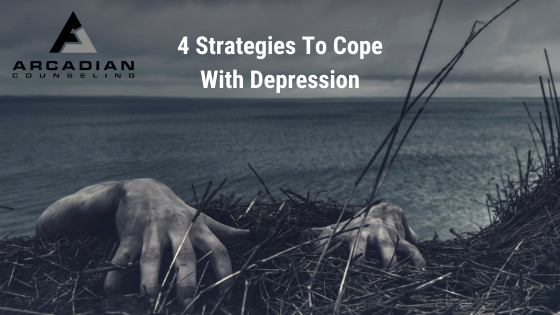The average person has around 60,000 thoughts per day. But what if the majority of those thoughts are negative? Imagine the impact on your psyche and your life if you had thousands and thousands negative thoughts each day? Welcome to the fresh hell of trying to cope with depression.
How To cope With Depression
1. Change How You Think
One of the most powerful ways people can pull themselves out of the depths of depression is to change their thinking patterns. This is why cognitive therapy can be such a profound change agent. The approach is based on the fact that thought-processing errors (i.e., cognitive distortions such as black/white thinking, always/never thinking, should statements, emotional reasoning and more) contribute to a depressed feelings.
Simply put, you can’t experience a feeling without a thought that precedes it, i.e., thoughts create feelings. So if all the thoughts rolling through you mind are shitty, guess how your going to feel?
By adjusting how you react to your thoughts, you automatically change how you feel.
Seems pretty easy right? ???? I know…but take it from me, it can be done.
2. Кеер Track of Your Thoughts

A great skill in learning to cope with depression is recording your thoughts so you can identify patterns.
Many people are in denial about their thought patterns. They don’t want to believe they are overly negative or pessimistic. Catching yourself and writing down as many negative thoughts as you can will help you start to see your thought patterns more clearly.
You could write things like. “I hate my body.” “My boss is an #$%.” ” I hate winter. “I can’t stand getting up so early.” “People suck.”
3. Identity Triggers
Once you get an idea of the frequency of your negative thoughts, try and pinpoint the triggers for them. Your journal will also come in handy here, because it will help you identify certain types of events that set off a chain of negative thoughts. Triggers can include things like getting rejected or ignored, or having an unkind remark said about you.
4. Positive Conversion
The way we think is habitual. But the good news is you can create new, more positive thinking patterns.
To do this you’ve got to start converting all of those negative thoughts into positive ones. It will be hard at first, and you will most likely feel as it you’re lying to yourself and pretending to be a glass-half full Pollyanna.
But, as they say, “You’ve got to fake it until you make it.” Though thinking positively may feel foreign to you and like a waste of your time, you are re-training you brain to think (and feel) good.
Every time you have a negative thought, stop, recognize it as negative, and immediately flip the switch and create the positive opposite thought in its place. This could look like:
Negative thought: “I’ll never get this report done on time.”
Positive Switch: “I’m making great progress and being careful to always check my work.”
Be careful though when doing this. It’s important not to tell yourself something that isn’t true. This will create cognitive dissonance and can create further distress.
For example: Don’t tell yourself: “I’m in the best shape of my life.” Do tell yourself: “Everyday I’m working to get in better shape.” Of course, these need to be true.
Life is short but struggling to cope with depression can feel like an eternity. If you’ve tried these methods (or others) and are still struggling, find an awesome therapist you like and trust to help.
James Killian, LPC is the Principal Therapist & Owner of Arcadian Counseling in Greater New Haven, CT where they specialize in helping over-thinkers, high achievers, and perfectionists reduce stress, increase fulfillment and enhance performance so they can move From Surviving To Thriving.



